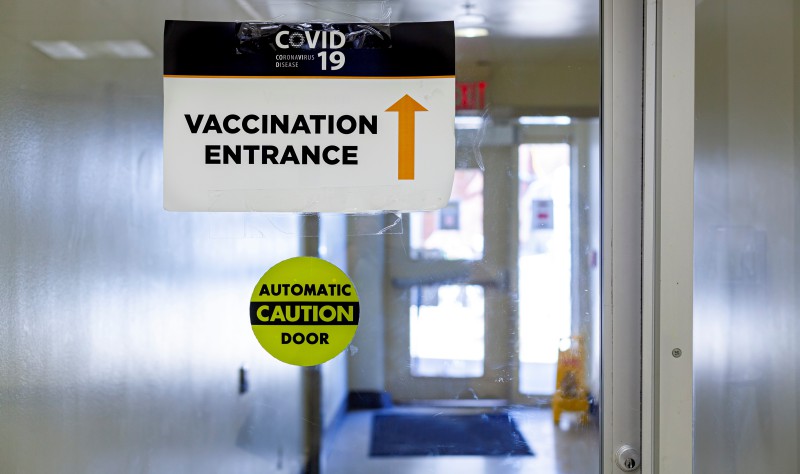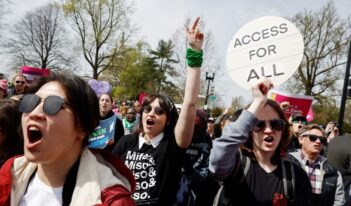
COVID-19 vaccine distribution campaigns must prioritize compliance with disability laws.
As COVID-19 vaccine distribution accelerates across the country, federal and state officials have received simple orders from the Biden Administration: “Protect those most at risk and advance equity.”
For too many Americans with disabilities, this directive has been an empty promise. Early reports have found that many vaccine outreach campaigns and facilities fail to comply with federal laws to promote access to medical services for individuals with disabilities.
These laws include the Americans with Disabilities Act (ADA) and Section 504 of the Rehabilitation Act. Title III of the ADA broadly prohibits discrimination in all places of public accommodation. Hospitals, doctor’s offices, and medical clinics—including vaccination facilities—are all considered public accommodations under the ADA.
Similarly, Section 504 of the Rehabilitation Act requires federal agencies to “provide individuals with disabilities an equal opportunity to participate in their programs and benefit from their service.”
But when it comes to the distribution of COVID-19 vaccines, individuals with disabilities face numerous barriers. Just signing up for vaccination, for example, can be unnecessarily burdensome for those with disabilities.
In late February, Kaiser Health News reported that 94 online vaccination websites across all 50 states are not accessible for the blind and visually impaired. Even the Centers for Disease Control and Prevention’s (CDC) sign-up portal has been singled out for its inaccessibility.
Once individuals with disabilities arrive at a vaccination facility, they may encounter further barriers. Facilities can lack ease of navigation for individuals who use the assistance of a wheelchair. They may lack places to sit for individuals who cannot stand for long amounts of time.
Individuals with sensory disabilities may be unable to wait in line for long periods of time. Others with cognitive disabilities may require that vaccine facilities be equipped with easy-to-understand instructions. Deaf individuals may also need alternative communication options.
Noncompliance with federal disability law need not be intentional to impede access to vaccines. In fact, current noncompliance may sometimes grow out of limited funding and the pressure to get shots in the arms of whoever shows up. After all, many vaccine facilities have been quickly repurposed for emergency use—including abandoned retail stores and storage garages.
Regardless of intention, making vaccine distribution facilities more accessible could not be more important for individuals with disabilities. Data suggest that Americans with intellectual and developmental disabilities are between two and three times more likely than the general population to die if they test positive for COVID-19. Expanding vaccine access is crucial to ensure these individuals can obtain their vaccines in a timely manner.
In early March, a group of U.S. senators sent a letter to federal enforcement officials urging them to correct ADA and Rehabilitation Act deficiencies at federal facilities. The letter also urges federal agencies to work with states to promote more accessible vaccination outreach and delivery at other facilities.
Section 504 of the Rehabilitation Act requires agencies to “give primary consideration to the request of the individual with a disability.” A good starting point would be for vaccine facilities to ask individuals with disabilities what accommodations would be most meaningful to them.
Although agencies have yet to issue direct responses to the senators’ letter, the CDC has since updated its vaccine distribution guidelines to emphasize the need for accessible outreach and vaccine issuance for disabled Americans.
The new guidance urges providers to conduct vaccine outreach campaigns in a variety of accessible formats, such as American Sign Language and braille. The guidance also highlights the need for ADA accommodations at vaccination sites themselves—such as special hours for people who need extra assistance and extra space for individuals who use assistive devices such as wheelchairs.
The CDC guidance is an encouraging first step. But the status quo must change. As National Federation of the Blind President Mark A. Riccobono has noted, “a national emergency does not exempt federal, state, and local governments from providing equal access for persons with disabilities to vaccines.”
To ensure that all Americans have meaningful access to vaccines, especially those at high risk of suffering from COVID-19, the Biden Administration must take more aggressive actions to affirm its commitment to ADA and Rehabilitation Act compliance.
A crucial next step would be to provide greater federal funding devoted to accessibility. Many vaccination clinics are staffed and funded by federal agencies such as the Federal Emergency Management Agency and the U.S. Department of Defense. These federally run clinics must, by law, have the resources they need to attract and provide vaccinations to individuals with disabilities in need of additional assistance.
When it comes to receiving essential, life-protecting vaccines, accessibility is not optional.



